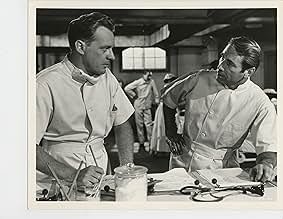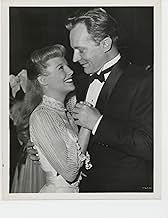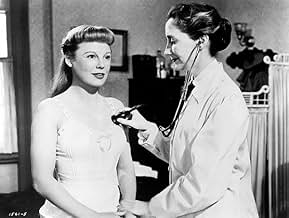A young woman decides to become a doctor at a time when women are not being made welcome in the field of medicine. Eventually, her determination and skills end up earning the respect of her ... Read allA young woman decides to become a doctor at a time when women are not being made welcome in the field of medicine. Eventually, her determination and skills end up earning the respect of her male counterparts.A young woman decides to become a doctor at a time when women are not being made welcome in the field of medicine. Eventually, her determination and skills end up earning the respect of her male counterparts.
Herbert Anderson
- Dr. Barclay
- (as Guy Anderson)
Featured reviews
It's the turn of the century New York City. Emily Dunning (June Allyson) is taken with Dr. Marie Yeomans who saved her mother's life. Yeomans is an established doctor who still faces sexist treatment all the time. She helps Emily get into Cornell medical school. Fellow student Ben Barringer falls for Emily and proposes to her but he's still holding onto old fashion ideals.
It's a female empowerment biopic. The premise is straight forward. For me, the most compelling may be the horse drawn ambulance. I don't think I've seen one of those in any movie. Sure, the movie is not about the ambulance but I find it great fun thrills. All in all, it's a solid well-acted standard biopic.
It's a female empowerment biopic. The premise is straight forward. For me, the most compelling may be the horse drawn ambulance. I don't think I've seen one of those in any movie. Sure, the movie is not about the ambulance but I find it great fun thrills. All in all, it's a solid well-acted standard biopic.
I loved this movie. June A. gives a great performance of the underdog female fighting for her dream despite the obstructive male bastion of turn of the century medicine. I was especially moved by the wonderful actress who played Dr. Yoman. She performed the role with a demure yet powerful presence. She is also one of the most beautiful women I have ever seen on film. It is she who carries the day for June and all her gender. Sadly, I never heard of her before. I hope to find other work she has done through IMDb. What else made this film? No raw sex, no violence, no gruesome scenes, just a great story that makes you feel good in the end.Wasn't a young James Arness fine as the burley tattooed sailor with the dislocated shoulder? Mothers: show this film to your daughters.
Based on the memoirs of her character Ann Dunning Barringer, June Allyson gets
to play a woman doctor at a time when there weren't too many. The time of
the turn of the last century is captured very well.
Her own role model is that of Mildred Dunnock also a physician of the female gender who has had to be most discreet in order to earn a living in the medical profession. Allyson is not about discretion.
In fact as Allyson becomes a hero to the nurses in and around 1900 it wasn't that long ago that Florence Nightingale and Clara Barton opened the nursing profession for women. For them Allyson is dreaming the impossible dream.
The men in her life include Arthur Kennedy whom she breaks things off with because he a doctor wants his woman home with supper on the table and her supervisor Gary Merrill who also thinks there are men doctors and women nurses and the twain shall not meet. A man who believes in specific gender roles.
The Girl In White has a fine ensemble cast who give great support to Allyson who must have been grateful to get away from girl next door roles.
Her own role model is that of Mildred Dunnock also a physician of the female gender who has had to be most discreet in order to earn a living in the medical profession. Allyson is not about discretion.
In fact as Allyson becomes a hero to the nurses in and around 1900 it wasn't that long ago that Florence Nightingale and Clara Barton opened the nursing profession for women. For them Allyson is dreaming the impossible dream.
The men in her life include Arthur Kennedy whom she breaks things off with because he a doctor wants his woman home with supper on the table and her supervisor Gary Merrill who also thinks there are men doctors and women nurses and the twain shall not meet. A man who believes in specific gender roles.
The Girl In White has a fine ensemble cast who give great support to Allyson who must have been grateful to get away from girl next door roles.
The Girl in White might be seen as a feminist drama by some. It concerns a woman at the turn of the century who wants to become a doctor (June Allyson) who faced adversity when the men around her try to squash her dreams. She prevails and wins their respect including that of the man who wants to marry her (Arthur Kennedy). The reason this movie works is that the message isn't pushed upon the audience the way it would be if the film were remade today. It is somewhat inspirational, but mostly it just tells a story.
Allyson is great as always and very sweet. A line from the movie describes her well, "You just make people feel good so that they forget themselves, their own troubles. Sometimes that means more than any medicine." The man who speaks the lines, Kennedy, is excellent in this film. He has mastered the art of showing emotions without verbally referencing them first.
Allyson is great as always and very sweet. A line from the movie describes her well, "You just make people feel good so that they forget themselves, their own troubles. Sometimes that means more than any medicine." The man who speaks the lines, Kennedy, is excellent in this film. He has mastered the art of showing emotions without verbally referencing them first.
This is a fairly accurate re-telling of the Emily Dunning story. She was a turn of the century doctor, and being a woman doctor, therefore treated like a freak, or publicity hound. Sadly, the tale is always the same: woman/minority enters field dominated by white males and is mistreated and pressured to quit. Dunning was a doctor decades before women were given the right to vote! And she didn't just deliver babies, she was out on ambulance calls day and night. Quite an impressive figure, but June Allyson (reminding me of a more winsome version of ER's Maura Tierney) is only adequate as Dunning. The film has its moments, yet the struggles Dunning truly incurred in overcoming the male doctor establishment and public attitude is only moderately presented here. It's as if the male dominated film-making establishment didn't want their doctor counterparts to look too bigoted. And much of the film is devoted to Allyson's relationship with Arthur Kennedy (Dr. Barringer -- in real life became her husband). Once again, the filmmakers are more concerned with stressing the standard woman-as-love-interest-only angle. It also starts to slow down in the second half, unfortunately. But this is the only film covering Dunning's interesting story so it's worth looking at at least for that reason.
Did you know
- TriviaBased on the life of Emily Dunning Barringer (1876-1961). She graduated from Cornell University School of Medicine in 1901. Her surgical residency was at Gouverneur Hospital in Lower Manhattan, New York City.
Details
- Release date
- Country of origin
- Language
- Also known as
- Bowery to Bellevue
- Filming locations
- Production company
- See more company credits at IMDbPro
Box office
- Budget
- $1,088,000 (estimated)
- Runtime
- 1h 32m(92 min)
- Color
- Aspect ratio
- 1.37 : 1
Contribute to this page
Suggest an edit or add missing content

































